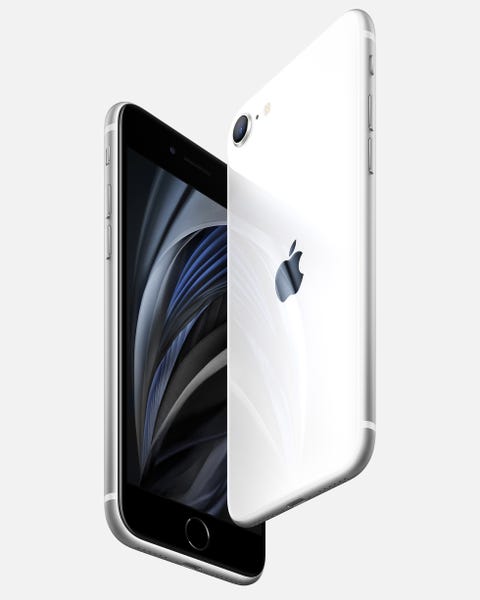Once, in 2009, I owned a jailbroken second generation iPod touch. Since then, I've spent the last 10 years on a carousel of Android devices. But with the launch of the new, affordable iPhone SE earlier this year, I decided that maybe a new decade was a good enough reason to give iOS a try again. After a little over a month on the iPhone SE, here's what I found — and why I don't think I'll go back.
Switching was way easier than I expected
Over the years of my tech blogging career, I have switched between dozens of Android phones. Pixels and Samsungs, LGs and OnePluses. Since Android tends to be heavily customized by phonemakers, switching between Android phones still requires some adjustment. And I was delighted to discover that switching over to iOS — a completely different operating system — was barely any harder to get used to.
In part, that's because iOS has, uh, "borrowed" a lot of the quality of life features that had previously kept me loyal to Android. iOS 8 introduced third party keyboards that support haptic feedback — a small detail I don't think I could live without. Apple's own keyboard picked up a "swipe" mode in iOS 13. In iOS 10, we got the option to clean up clutter by removing default apps from the home screen. And iOS 14 will let you hide Home screen apps all together for die-hard digital minimalism, and even set non-Apple apps as default for mail and browser. It's even bringing widgets!
This general, long-time convergence mostly removes the biggest pain point from switching operating systems on any device — having to engineer completely novel alternatives to do the things I'm used to, or change how I behave. Because features like the Notification and Control Centner pretty directly correspond to Android's combined Notification Shade, I was left with the much smaller task of merely locating a functional equivalent, and retraining my muscle memory to call it up instead. The convergence of app availability means that virtually all my favorite apps were on iOS. I've found only one obnoxious but extremely nerdy exception so far.
I do worry, however, that I might be making a one-way trip. Part of the ease of going to Apple from Android is that Google's apps are all available cross platform. Apple's services are pointedly not. And now that I'm a "blue bubble," I can imagine getting sucked into Messages-based groupchats that would make switching back to Android a dicey proposition.
The reason I want to switch is way under the hood
So if Android and iOS are roughly compatible, why switch? For me, it has very little to do with software features, or even hardware options, so much as a bigger principle: privacy.
Over the past few years, Apple has been weaving some pretty aggressive privacy-protection features into iOS, ranging from "Sign in with Apple" as a way to create accounts with various other services while shielding your personal information or new app permission features in iOS 14 which have revealed the way some apps suspiciously peep on the information in your clipboard.
Of course this isn't altruism. It's a weapon that Apple can use to bludgeon its competition — to your benefit. Google, while it does not technically sell your data, uses it to fuel a significant portion of its business by helping advertisers target you with ads. Apple, meanwhile, has a business primarily built around selling hardware and, increasingly, services like Apple TV+, Apple Music, and iCloud storage.
While Apple has dabbled in selling ads to supplement that income, and perhaps isn't as militant on the subject as its rhetoric may lead you to believe, it can nevertheless push on matters of privacy that don't endanger its bottom line nearly as much as its competitors. The downsides of this approach surface elsewhere (like Apple's increasingly contentious "Apple tax" on developers who sell software in its store), but the privacy features are real, good, increasingly important and reason enough for me to make the switch.
I just miss my precious back button
If there's one thing I well and truly miss about Android — and which I'm not sure I'll get over — it's the back button. The iPhone SE 2020 mercifully still has a Home button, which I treasure, but in my eyes it's just no match for Android's three-button menu design. On
Android, I could always count on the Back button, always in the bottom right corner and built in at an operating system level, to take me one step backwards in my thought process. Want to get back to Twitter from a link you clicked on? Hit back. Make the keyboard disappear after clicking on a text box? Back button. Go back to your previous browser page? You know what it is.
iOS, with its one-button (or, I shudder to imagine, no-button) simplicity, just can't compare to the beauty of letting my muscle memory take the reins. Instead of heading back to the same corner of my screen, I have to hunt around for a back arrow or "Done" text, all dependent on the what app I'm in. It's a small but foundational change I just haven't been able to shake.
But all in all, I really expected it to be much worse.
This content is created and maintained by a third party, and imported onto this page to help users provide their email addresses. You may be able to find more information about this and similar content at piano.io
"Android" - Google News
July 09, 2020 at 06:10PM
https://ift.tt/320gDn1
What It's Like to Switch to iOS After 10 Years on Android - Gear Patrol
"Android" - Google News
https://ift.tt/336ZsND
https://ift.tt/2KSW0PQ
Bagikan Berita Ini















0 Response to "What It's Like to Switch to iOS After 10 Years on Android - Gear Patrol"
Post a Comment